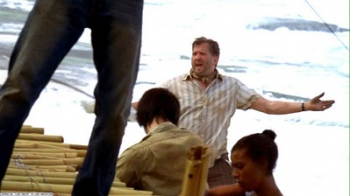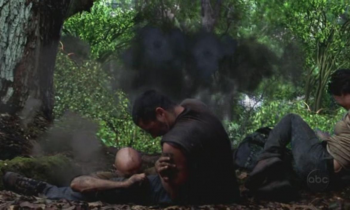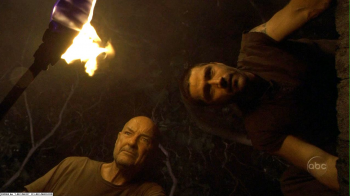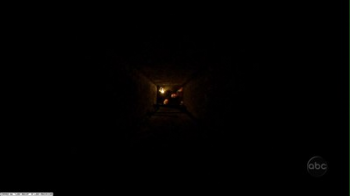What is Lost?
In two recent columns in Flow (“The Loss of Value (or the Value of Lost)” and “The Value of Lost Part II”), Jason Mittell has argued with some vehemence that “Lost is the best show on American broadcast TV.” The claim seems puzzling on several levels, despite the fact that Lost is certainly a very well-made and provocative program that many viewers, myself included, find extremely compelling. Is there an objective, or even interesting, sense in which one can claim that one program or the other is “the best”? What exactly does it mean for a TV program, or another cultural object, to be “the best,” or even “aesthetically good”?
Debates on issues like this are so familiar within the realm of cultural criticism, which I take to be the main goal of Flow, that I find it surprising to have them so decontextualized. So many of the theorists we read even in introductory Media Studies classes show the problems with trying to make such judgments outside of their cultural contexts; surely it is a part of the cutural criticism of media itself to become familiar with the ways that canons of taste reflect the social, political and cultural norms of the societies and persons who produce them. Rather than arguing about which objects do or do not meet certain standards of taste, I understand the task of cultural criticism to be to explicate why certain kinds of aesthetic principles resonate with the cultures in which they are embedded. In this sense it is surprising that Mittell (and by extension Flow itself, and also its readers, including those who have commented on Mittell’s articles) think the question of whether Lost is the best program or not is a question for the cultural criticism of television. It is especially surprising given Allison McCracken’s earlier essay on other programs that hints at why the logics on display in Lost (“Lost“) might be so relevant to our own cultural situation, and on which the following analysis builds.
In particular, as a response to the enormous wave of reality television programs over the past few years, Lost restages the “lost in the unknown wilderness” narrative that is primary to the West (especially via the Robinson Crusoe story) and primary to much serial television (Gilligan’s Island, The Prisoner, Lost in Space, Star Trek: Voyager), and also seemingly primary in reality TV, via the one-character-“dies-“-each-week structure popularized in Survivor and maintained in many other reality TV shows.
Lost recapitulates all of these formulae while explicitly scripting its characters’ interactions, thus foregrounding exactly the process that in reality TV is controversial, often hidden, sometimes absent. At the same time, the show is organized around a central mystery, the “purpose” of the island (and a number of associated mysteries including the “identity of the monster,” “connection of all the central characters,” “nature of the plane crash,” etc.).
In structuring an ongoing serial television program around both the promise of main-character “death” and a single primary mystery, producers face a dilemma rarely faced by novelists and filmmakers. Media that usually have a concrete ending point (novels, movies, hour-long police dramas, even many video games) can sustain and then resolve a mystery in a more-or-less satisfying manner. But when a single central mystery is made structural to the show’s premise, it becomes almost impossible to reveal the mystery without undoing the show itself. This structure creates tension, and because of that, the core mystery, as a kind of Hitchcockian MacGuffin, ends up having very little content itself, and becomes more like a metonym of the show’s popularity (the more popular the show is, the more pressure there is to “reveal” very little of the mystery so as to keep the premise intact).
Instead of the mystery, in fact, the show focuses on character and background, but then, due to the Survivor structure, these character stories also exist in metonymic relation to the actors’ roles on the show, and to the show’s popularity. The more successful the show is, the less about the characters can be “definitively” said, and against the Survivor structure, the more pressure there will be not to kill off the main characters, since these figures are tied at least as directly to capital as are their reality-TV counterparts. When a single actual character from the show (Boone) was killed during the first season, stories were published in popular magazines outlining the actor’s grief at losing his role.
Thus in the season finale, although the death one or more major characters and the revelation of a major mystery were teased to viewers repetitively, they were also not on offer. Instead, viewers of the season finale experienced little drama and an apparently unexpected and formalized recapitulation of the show’s premise. Many of the season’s apparently central mysteries were teased in slow-motion chase sequences, miming our own mechanical implication in the media circuit. But unlike in Survivor, it was a new character, much like a Star Trek “red shirt,” who was to be sacrificed, rather than any continuing member of the cast. The new character, Artz, was introduced two episodes prior to the finale as a helper for Michael as he is building the raft.

Figure 1. Artz in the scene from episode 22 where he is introduced
In the finale, Artz insists on coming with the main characters on a search for dynamite, despite the lack of dramatic reason for him to go, and thus threatening the program’s characterological set-up. Suggestively, Artz’s dialogue during these scenes focuses on exactly two areas: first, that dynamite itself is very dangerous and can go off unexpectedly, and second, that everything on the island seems focused on the main characters like Hurley (to whom Artz speaks these lines) who are like the popular kids in high school. No other character talks about the dangers in dynamite, and no other character is harmed by it. No other character speaks about the strange dramatic setting of the show, and the improbabilities the show sustains in order to work its synthetic action. This is the first new character to be introduced to the main group since the beginning, and it would be far too obvious to introduce such a character just to kill him off so obvious in fact that there would be little dramatic tension in actually killing him off.But Artz blows up while handling dynamite in the first half-hour of the two-hour finale, thus immediately reassuring viewers that no member of the core cast will be killed off and failing to live up to the true Survivor promise.
By pointing out that Hurley has lost no weight in their months of privation, Artz briefly occupies the ego world that sees that this journey leads nowhere. We are supposed to be relieved that no main character has died, and yet in this scenario Lost shows that it depends precisely on revealing nothing of its mystery, since its mystery must remain mysterious, since the show must remain the show, despite the repeated promise to show us more. The longest extended sequence during the finale shows the main characters assembling on Flight 815 (the flight that lands them on the island in the first place), but instead of ending in drama this sequence ends in stasis, showing the characters in their seats and ready for takeoff. Some viewers report seeing a tentacle enveloping John Locke’s leg as he is pulled down a hole in the ground by the show’s “monster,” and a fog of smoke contains traces of what look like the most familiar of SF devices, the intelligent cloud of nanobots, perhaps also present in the show’s pilot.

Figure 2. Black smoke that appears to have “eyes” or a “face” in it.
Lost dramatizes exactly its own scripted coming-into-being, the very process of its writers and producers crafting a suture that we viewers must engage with and submit to, gluing the stand-ins of the main characters’ life histories (the true dramatic content of most episodes) to the real-time reality-TV-like mystery story supposedly at the series’ heart.
The dynamite that killed Artz is finally used at the end of the episode to open the hatch, over Hurley’s objection, that is, over the objection of the character whose presence has now been marked out precisely as the one that shows that there is no island, no journey, no mystery at all. “Don’t open the hatch! The numbers! They’re evil!” Hurley runs and cries, perhaps thinking of Nielsen as much as Lost‘s cryptic numeric sequence, but they blow open the hatch, revealing the mise-en-abyme that is in fact the show’s premise, the thing the show shares with we its viewers. We are on a journey, pursuing an empty object, a desire we do not understand.


Figures 3 & 4. Final scenes of Lost
We suspect there is safety, knowledge, insight down there, even though we know that all that is down there must be structured precisely by our own desires. We can only look down into the void that we have created for ourselves. Who are we, that we find such an obviously aporetic narrative, one that mimics the commercial structure of contemporary television itself, so profoundly compelling?
References
McCracken, Allison. “‘Lost.’” Flow 1.4. November 2004.
Mittell, Jason. “The Loss of Value (or the Value of Lost).” Flow 2.5. May 2005.
—. “The Value of Lost Part II.” Flow 2.10. August 2005.
Links
Lost forum 1
Lost forum 2
Lost fansite with forums, screencaps, media
Official JJ Abrams creator’s site with writers’ forum
Unofficial Lost transcripts
Image Credits:
1. Figure 1. Artz in the scene from episode 22 where he is introduced
2. Figure 2. Black smoke that appears to have “eyes” or a “face” in it.
3. Figures 3 Final scenes of Lost
4. Figures 4 Final scenes of Lost
Please feel free to comment.
Notes from the Aporia
I can’t answer the question of who are “we,” but as one of those “we,” I think that Lost has more in it than just an aporetic narrative. After all, Veronica Mars is also based on a mystery, as is Alias, but personally I’m not engaged by them, whereas I am engaged by Lost. So surely there must be something more in it for me — I’d offer that its characterization is compelling, the mix of genres is fascinating and at times fun, its pathos is at times touching, its acting surprisingly good, its scripting intelligent.
I think Golumbia is spot-on to note that shows like Lost face a fundamental problem in a commercial television system: that the mystery some viewers want answered could kill the show if provided … so it may never be offered. But stories have always been about much more than plots and endings. Indeed, being an at-times lazy reader, I know I’ve often *loved* a book, yet not finished it. Perhaps, then, this might be a saving grace of shows like Lost (for some viewers): the aporia, and the inability to end, promises them that their beloved narrative, characters, style, etc. will keep on going. Being lost in Lost might be the point: not finding the end. So, it’s like strolling through Venice: getting lost is the best thing to do, rather than know where you’re going.
Valuing debate
I’m happy that David has taken up the provocation that I purposely laid out in my columns – I’m surprised it took so long for someone to rebuke aesthetic valuation!
Just as David is puzzled as to why I’d offer such an argument, I’m puzzled by his rebuttal – in the first part of his column, he reiterates the reasons why evaluation has been marginalized in media studies, but doesn’t explain how to reconcile his “always contextualize” mandate with the processes of evaluation that we do engage in regularly as both viewers and scholars. I make no claims of universality or objectivity, but I’m not ready to cede that my judgments are simply symptoms of cultural conditions. Even if they were solely forged by context, evaluative judgments deserve being conducted openly and without shame.
And also without obscuring themselves with anti-evaluative rhetoric. The second part of this column seems to condemn Lost for not living up to its Survivor logic – but where was the show’s intended goal defined as being a scripted Survivor? It seems to me that you’re condemning the show for not living up to what you see as its promise, but this is simply your evaluative judgment (and one that I see no rationale for, given that there was never any promise of a death-a-week).
More importantly, how is your critique of the show’s failings any different in method than my praise of its successes? We both evaluate based on explicitly-stated criteria that stem from aesthetic norms and cultural contexts. We disagree in judgment, but how does your evaluation support your claim that cultural critics shouldn’t be offering aesthetic evaluation?
I look forward to more friendly debate.
Lost & cultural critique
I appreciate both of these responses. I think they don’t quite get to my questions, though: I don’t mean to say that the aporetic structure of LOST explains its success, and I certainly don’t mean to condemn LOST for not living up to any particular structure or other. I understand the task of cultural criticism not to be to contextualize, but to try to understand how and why certain objects of culture come to be produced, consumed, and valued in the contexts in which they are found.
I don’t feel shameful about liking LOST–indeed, I think my article makes clear that I pretty much agree with Jason about LOST being an especially good TV program. (It may be important to note here that I actually drafted this piece before Jason’s first article went up on FLOW, and that I did not actually intend it to be a rebuttal of any sort.)
That said, I don’t think the reason straight-out evaluation is downplayed in cultural criticism is because of shame or avoidance.
Because my background is primarily in literary studies, I will shift the terrain slightly. I think we can all agree that Shakespeare and Joyce wrote works of very high quality. (At least, most of us would agree with that). But the reason leading journals don’t publish articles that argue whether or not Shakespeare or Joyce are “the best writers in the English canon” is because these really do not seem like questions for critical analysis. I don’t deny they are important, and I would assert that both Shakespeare and Joyce remain important subjects for critical analysis in part because of the high quality of their writing. But I see a difference between trying to understand what is going on in Shakespeare and Joyce, and asserting their quality; I urge my students to work on analysis rather than evaluation; and I am not convinced that a forum like FLOW will be well-served if it embraces evaluation full-on.
To go back to Jonathan’s comment: I think the aporetic structure of LOST in particular does say something about our cultural moment, and the role of television and the networks in our culture. It does “worry me,” in a relatively abstract way, that we can all (very much including me) be so attached to a mystery that (unlike mystery novels or Hitchcock films) clearly has no solution at all, but merely the appearance of a solution. But I aqree that many shows have taken up this structure without being popular, or aesthetically successful; and I suspect that other programs will be popular and/or successful without using this particular form. I am not suggesting we necessarily resist enjoying our symptoms, but only that we also take up the opportunity to try to understand what that symptom can tell us about ourselves.
Valuing more debate
I appreciate David’s response here. I totally agree with David that the primary purpose of cultural scholarship should not be to assert value judgments — my piece on Lost is nothing I would ever consider publishing in a more traditional academic forum. But it seems to me that TV scholars, more than literary, film, or other cultural critics, resist value judgments to such a point that they wrap themselves in knots to avoid claiming quality as anything but a cultural symptom wrapped in caveats of contingency. Look at the copious Buffy or X-Files criticism for good examples of this. My argument in Flow was not that we should all shift our foci to evaluative critique, but that we should own up to our own evaluations, and discuss the criteria for them. I think both of our analyses do this, while pointing to larger issues — David toward cultural conditions, me toward genre & narrative norms.
The literary scholars who don’t bother to evaluate Shakespeare & Joyce make no claims that they are not highly valued — rather it is assumed within the discipline that certain values are established and thus don’t need to be asserted (although I think if you read scholarship from the “canon wars” you’ll find critics explicitly asserting value of marginalized works). In TV studies, it seems to me that the only commonly held assumption on this issue is that we all have our own socially contingent tastes, and we dare not allow them to cloud our “real” critical work — this is the assumption what I want to dispel.
Now the more important question: what’s in the hatch?
The good, the bad, and the critical
This exchange has been excellent — thanks for the comments and the column!
The contestation between what has herein been labeled “critical” and “evaluative” approaches reminds me of a statement David Bordwell made about the need to have good theories for good film criticism. That is, that no single theoretical panacea or special panoptical position exists that a critic can assume which provides a complete way of describing or understanding a filmic experience or text; arguing, therefore, that we should embrace a multiplicity of theories. The question becomes then, what is the relative relationship between competing intellectual attitudes (i.e., critical versus evaluative questions)?
Perhaps my additional follow-up question is too reductive, or ignores some insurmountable obstacle inherent to this debate that I’ve missed, (but I’ll ask it anyway): why can’t these two perspectives be reconciled, be posed in tandem, or be sequentially linked? Asked differently, can critical analysis make room for evaluative judgments? Aren’t personal, normative standards operative and tacit in critical frameworks? (I believe this echoes one of Mittel’s points.) For example, a feminist framework assumes certain claims about how the world is, and how it could and should be. Likewise, phenomenological approaches recognize the value of individuated, contextualized, and situated subjectivities — it too, then, carries with it all of its own evaluative assumptions (even if it doesn’t bother to call them good or bad).
On a more practical and personal note, I’m hesitant about permitting bold, evaluative judgments (especially unqualified ones) into the classroom. My experience has been that they often preempt and cloud a group’s still-developing discussion. If a “that sucked” can’t be reworked into something more productive, it threatens to prematurely shut down the class dialog; and nothing, again in my experience, has the power to elicit caustic and visceral responses like screening non-narrative fare (e.g., why are we watching this flicker film crap?). The challenge of intro to media studies classes is to not have the students confuse critical viewing with negative viewing. Learning and applying analytic frameworks need not suck the pleasure out of media reception. Ideally, the opposite should be the case. Seeing a familiar text in a new way should be exciting and fun. Conversely, for those of us who have long since surrendered ourselves to the pleasure of critical reading, we too should ask why, or how, these frameworks allow us to enjoy our favorite poisons, and how come we still rely on / revert to labeling moving media as “good,” “bad,” and every epithet in between.
Well I am an lost fanatic too, but I am Brazilian, don’t can undestand nothing what you write in your post… but… I like many your photos…
Very beautifull images.
Pingback: Syllabus « Pop Culture E2043